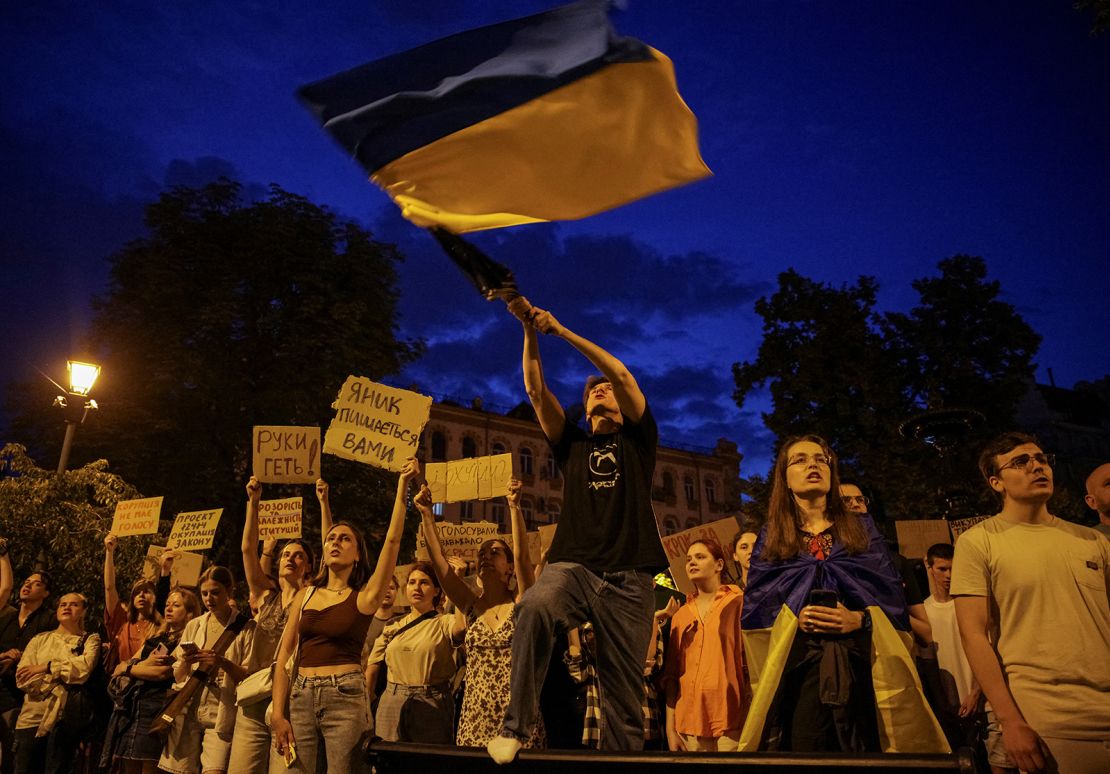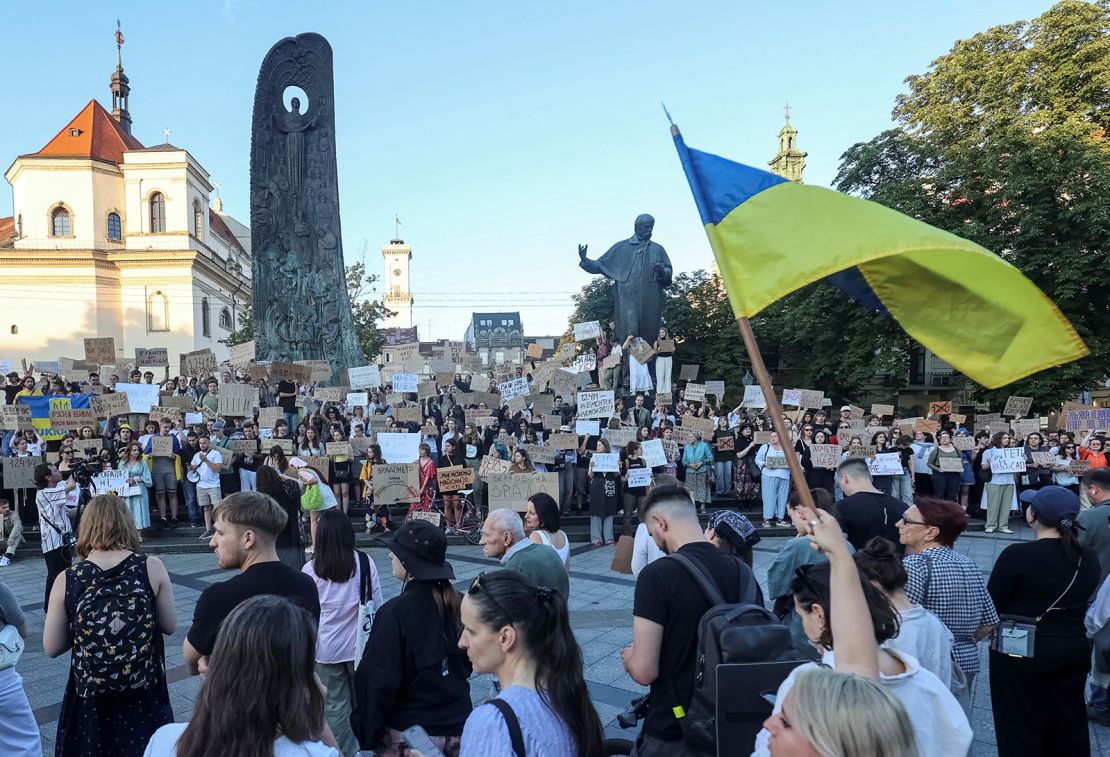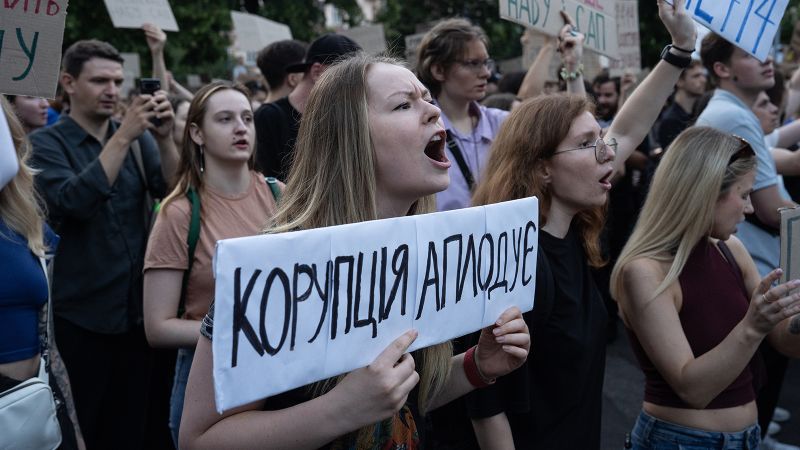CNN
—
Ukraine has seen the first major anti-government protests since the start of Russia’s full-scale invasion over three years ago, as a move by President Volodymyr Zelensky to curb anti-corruption agencies sparked fury across the nation.
Defiant crowds gathered in the capital Kyiv on Tuesday, as well as Lviv in the west, with smaller groups gathering in Dnipro in the east and Odesa in the south, after Ukraine’s Parliament — the Verkhovna Rada — approved a bill that grants oversight of two key anti-corruption agencies to the prosecutor general, a politically appointed figure.
Critics say the move will hamper the two bodies, the National Anti-Corruption Bureau of Ukraine (NABU) and the Specialized Anti-Corruption Prosecutor’s Office (SAPO), and take Ukraine further away from its dream of joining the European Union. The EU has made it clear to Kyiv that it must implement strong anti-graft measures if it wants to become a member. The Biden administration urged the Ukrainian government to do more to root out corruption in 2023.
Ukraine has long been seen as one of the most corrupt countries in Europe. Allegations of corruption have been wielded against some of the country’s top officials, including several close allies of Zelensky – such as former Deputy Prime Minister Oleksiy Chernyshov.
The bill was fast-tracked through the parliament and signed into law by Zelensky late Tuesday. The Ukrainian leader said in his nightly address that both organizations would “continue to work” but defending his move as a necessary step to rid the two agencies of “Russian influence.” This came after Ukrainian authorities raided one of the bodies on Monday and arrested two of its employees “on suspicion of working for Russian special services.”
He also criticized the previous system as leading to cases being stalled for years.
But opponents say the two agencies will no longer be able to operate independently because the new law gives the prosecutor general power to influence investigations and even shut cases down.
Criticism came from all corners of society. Former Foreign Minister Dmytro Kuleba slammed the move in a statement, calling Tuesday a “bad day for Ukraine.”
The move didn’t go unnoticed on the frontlines, where the military is struggling to hold back Russian forces. Referring to corruption that the agencies were working to root out, Yegor Firsov, chief sergeant of a drone strike platoon, said on X that “this is not a question of NABU or SAP. This is a question of barbarism,” adding that “nothing is more demoralizing than seeing that while you are sitting in a trench, someone is robbing the country for which your brothers are dying.”
Responding to the criticism on Wednesday, Zelensky said “everyone would work solely in a constructive manner to resolve existing issues, deliver greater justice, and truly protect the interests of Ukrainian society.”
The two agencies affected by the law, said in a joint statement on Wednesday that they were “deprived of guarantees that previously enabled them to effectively carry out their tasks and functions in combating high-level corruption.” They called on the government to reverse the law.
Crucially for Kyiv, the criticism is coming from both inside and outside of Ukraine, including from some of the country’s key Western allies.

The Ukrainian branch of Transparency International, a leading independent nonprofit group that monitors corruption around the world, previously urged Zelensky to veto the new law.
It said that the new law destroys Ukraine’s independent anti-corruption institutions, which it said were “one of the greatest achievements” since pro-European protests sparked the Revolution of Dignity in 2014 that ousted pro-Russian President Viktor Yanukovych.
The two agencies were both founded after the revolution, specifically to tackle corruption among Ukraine’s top political echelon.
NABU is in charge of investigation corruption allegations, passing them to SAPO to prosecute once it has gathered evidence. Transparency International also said the new law would undermine the trust of Ukraine’s international partners, as a myriad of global organizations stepped in to criticize the law.
Marta Kos, European Union’s top official in charge of the process of admitting new member states, said she was “seriously concerned” over the law.
“The dismantling of key safeguards protecting NABU’s independence is a serious step back. Independent bodies like NABU & SAPO, are essential for (the) EU path. Rule of Law remains in the very center of EU accession negotiations,” Kos said on X.
Meanwhile, the American Chamber of Commerce said the move was disappointing. It said the law “threatens the independence of Ukraine’s anti-corruption infrastructure and undermines trust in the country’s anti-corruption efforts.”

The Agency for Legislative Initiatives (ALI), a leading Ukrainian think tank that focuses on democracy building and scrutinizes the work of the country’s parliament, said in a statement that the new law is a “180-degree turn” in European integration efforts.
ALI said the law gives the Ukrainian prosecutor general “nearly unlimited powers,” including the authority to transfer cases to different prosecutors and effectively block any investigations by pushing through administrative obstacles.
The prosecutors working for SAPO have gone through a rigorous selection process that included international expert advisors, ALI said, adding they have expertise that is unparalleled in other parts of the law enforcement system.
ALI also said that while the law purports to be a response to the war and the current extraordinary circumstances, it envisions the oversight of the top prosecutor to continue for three years after Ukraine’s martial law is lifted.
Fighting rampant government corruption was Zelensky’s main campaign pledge ahead of the 2019 election. A former comedian who played Ukraine’s president on a hit TV show, Zelensky had zero political experience before his victory – but he tapped into voters’ dismay on the issue.
During the war, Zelensky has fired a slew of senior Ukrainian officials over corruption allegations, and his government has instigated anti-corruption measures, including the National Anti-Corruption Strategy.
International organizations, including the EU, the United Nations and the Group of 7 have previously praised Zelensky’s government for its anti-corruption efforts.
But those same organizations are now denouncing the new law – while its critics in Ukraine say Zelensky’s campaign platform to rid the country of corruption was simply empty promises.

